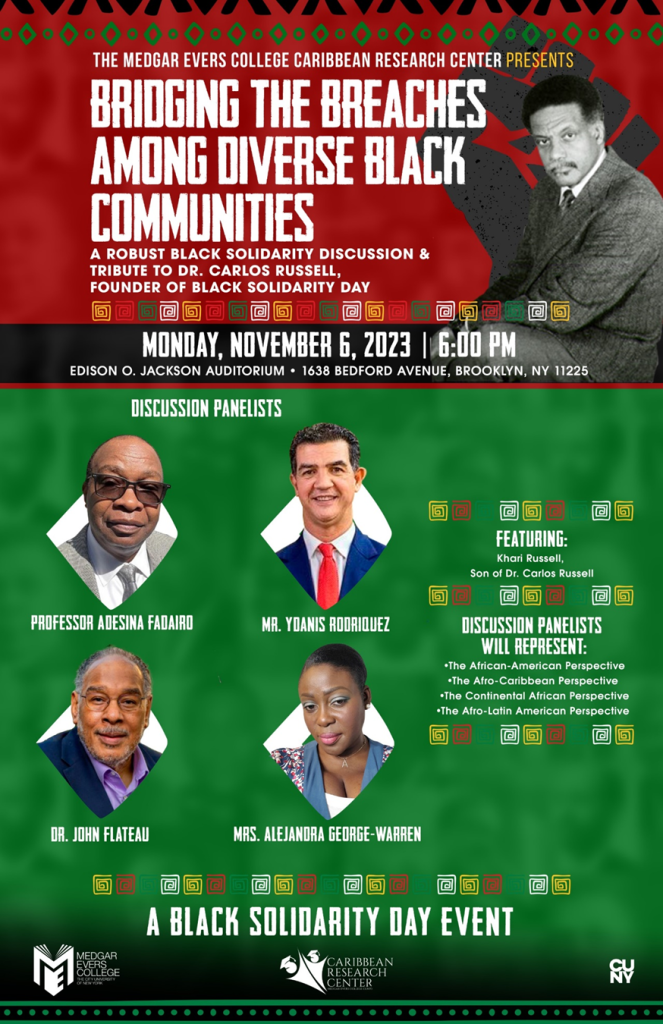Medgar Evers College Celebrates Black Solidarity Day Event to be held on Monday, November 6 at EOJ Auditorium
By David Gil de Rubio | dgilderubio@mec.cuny.edu
On Monday, November 6, the Caribbean Research Center will be recognizing Black Solidarity Day by hosting an event at the Medgar Evers College Edison O. Jackson Auditorium that starts at 6 p.m. and whose theme is “Bridging the Breaches Among Diverse Black Communities.”
Black Solidarity Day is a memorial day created in 1969 by the late Dr. Carlos E. Russell, a Panamanian-born historian and playwright who was also a Medgar Evers College professor. Traditionally held on the first Monday of November, which is also the eve of Election Day, the purpose is for members of the Pan-African diaspora to show the spending power of communities of color and participants usually spend that 24-hour period refraining from shopping, using mass transit or participating in any economic activities.
Caribbean Research Center Program Manager Eugene Pursoo organized this event and arranged to have four panelists representing four different perspectives: African-American (Dr. John Flateau), Afro-Caribbean (Mrs. Alejandra George-Warren), Continental African (Professor Adesina Fadairo), and Afro-Latin-American (the Honorable Ydanis Rodriguez). Dr. Russell’s son Khari will also be on hand to speak about his father.
For Pursoo, who personally knew Dr. Russell, this discussion is a crucial one to be having, particularly in this particular setting.
“I am delighted to have the opportunity to organize a discussion on the very important subject of Black solidarity,” he explained. “It is quite meaningful to me that it is taking place at Medgar Evers College, a Predominantly Black Institution (PBI) in the heart of Crown Heights Brooklyn, and spear-headed by the Caribbean Research Center. I also get the privilege to honor my friend and Black Solidarity Day founder Dr. Carlos Russell. He was a former diplomat who deeply believed deeply in the need for black unity on the local, regional and international levels.”
Strength in unity is the driving force for this discussion and something Pursoo feels can help remedy societal ills communities of color are often struggling with.
“Black communities around the world have produced some of the most brilliant minds and some of the most skillful and talented individuals,” Pursoo said. “Yet, these attributes, which in themselves are manifestations of the capabilities and capacities of Black societies, have not propelled Black communities out of situations of disadvantage. Wherever we find Black communities today, they are institutions of comparative disadvantages. One reason could be that despite a common history of oppression and exploitation, solidarity in and between the Black communities continues to be elusive.”
Pursoo added, “It is important because if we as a community are going to be making demands in this world and seeking to elevate our status in the world, we will have to be able to speak with a united voice. If we are divided among ourselves, we are weakened. This is a lesson that is very clear in our history. The idea of divide and rule to conquer has plagued us way back, even before slavery. That is the tool of colonialism when it went into Africa and dissected the continent—even before slavery became official. It existed before slavery. Slavery is just one of the brutal aspects of colonialism. The whole idea of dividing us as a people has been there. It is clear that in order to build a platform of progress, one of the first things we have to do is to find solidarity among ourselves.”
Attendees can expect the presentation to evolve into a general discussion in which the panelists will field questions from the audience.
